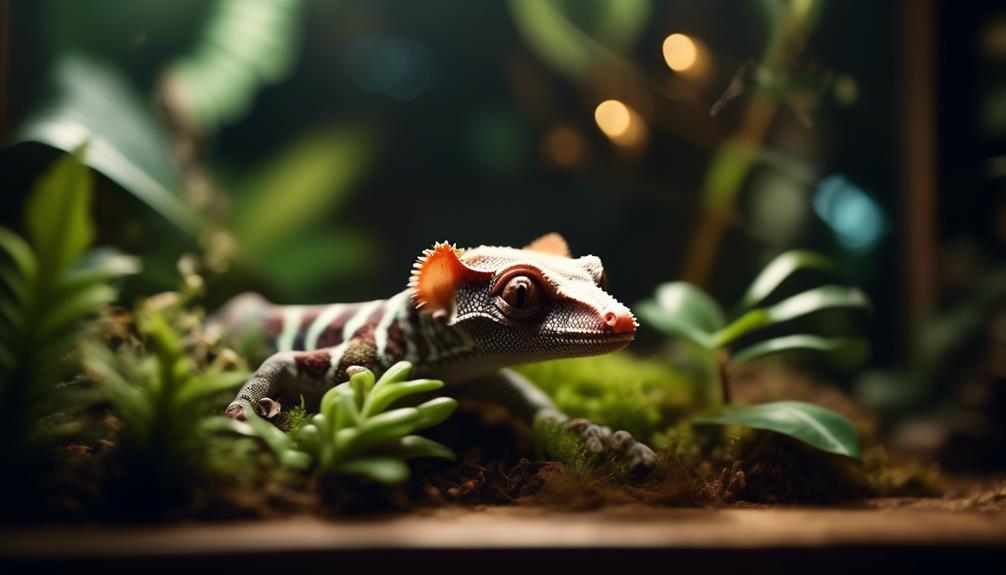Do you have a leopard gecko and are wondering if they can eat hornworms? Hornworms offer many nutritional benefits, but there are also risks associated with feeding them to your reptile. In this article we’ll explore the nutritional benefits of hornworms, the risks of feeding them to your leopard gecko, how to feed them safely, and alternatives to hornworms. With this information in hand, you will be able to make an informed decision about whether or not it is safe for your leopard gecko to eat hornworms.
Key Takeaways
- Hornworms are a highly nutritious food for leopard geckos, providing high protein, essential nutrients, and vitamins and minerals.
- Feeding hornworms to leopard geckos can be a tasty treat that adds variety to their diet and promotes healthy growth and development.
- However, there are risks associated with feeding hornworms, such as potential infestation, digestive problems, and fatal issues like impaction or bloat, so close monitoring and moderation are necessary.
- Alternatives to hornworms include crickets, mealworms, phoenix worms, and silkworms, which offer different nutritional benefits and can be safer options for feeding leopard geckos.
Nutritional Benefits of Hornworms
Hornworms offer a great nutritional boost for leopard geckos, with loads of protein and other essential nutrients – so they can’t resist! Rich in calcium and low in fat, these worms provide the perfect balance of dietary requirements for geckos. They also contain gut bacteria which can help to regulate the digestive system. Hornworms are an excellent source of vitamins A, B1, B2, B3, B6 as well as minerals such as zinc, copper and magnesium. Additionally, they are loaded with essential amino acids that help to promote healthy growth and development.
In addition to providing all these important nutrients for your leopard gecko’s health and wellness, hornworms also provide a tasty treat that your pet will enjoy. Their soft texture is easy to digest and makes them ideal for snacking on throughout the day. Plus their bright color helps to attract attention from your pet so they’re more likely to eat them readily!
Feeding hornworms regularly can be beneficial for both your leopard gecko’s health as well as their overall happiness; however it is important to understand the risks associated with feeding too much or too frequently before introducing this food into their diet. With proper care and consideration towards your pet’s dietary needs you can ensure that you’re providing them with all the nutrition they need while keeping them safe from potential harm.
Risks of Feeding Hornworms
Feeding hornworms to your pet could pose risks, so be sure to research before offering them. Underestimating the breeding habits of the worms can lead to an infestation in your home. Additionally, hornworms are very high in calcium and moisture content, so too many can cause problems for your gecko’s digestive system. The frequency of meals should also be taken into account; if you offer multiple worms at once, it can overwhelm their systems and lead to potentially fatal issues like impaction or bloat. It is important to understand that while hornworms are a great treat for leopard geckos, they must be monitored closely and provided with careful consideration.
Due to their nutritional value as a low fat source of protein, they can help support healthy growth when given in moderation. However, providing too much calcium or feeding them too frequently can have detrimental effects on your pet’s health. Researching thoroughly and understanding the full potential benefits as well as risks helps ensure that both you and your gecko get the most out of this nutritious snack! Taking these precautions will help you provide a safe environment for feeding hornworms without putting your pet in unnecessary danger.
How to Feed Hornworms Safely
Providing hornworms to your pet requires careful consideration, as if you are walking a tightrope between two cliffs – one of nutrition and the other of risk. Before choosing to feed hornworms, it is important to understand their nutritional benefits for leopard geckos, how they should be bought and stored safely, and how to feed them correctly.
- Buying Hornworms
- It’s best to buy live hornworms from a reputable seller who specializes in reptile food.
- Do not purchase wild-caught specimens as they can carry parasites or diseases that may affect your pet.
- Storing Hornworms
- Keep hornworms refrigerated at temperatures between 45-55°F (7-13°C).
- Make sure the container has holes for air circulation, as well as enough space so the worms don’t overcrowd each other.
Feeding hornworms should always take place in a separate container from where they are stored; this will prevent any potential stress on the worms caused by handling. When ready to feed, place one or two worms per gecko into another clean container lined with paper towels that have been dampened lightly with water – this will keep the worms from escaping during feeding time! Finally, be sure never to leave any uneaten portions of worm in the tank overnight; these can quickly become moldy and pose an additional risk for your leopard gecko.
With safety being paramount when providing any type of food for your pet gecko, following these guidelines will help ensure that feeding hornworms is done responsibly and successfully. Alternatives such as crickets or mealworms offer similar nutritional benefits but come with fewer risks than those associated with horns
Alternatives to Hornworms
If you’re looking for a safer option to provide your pet with nutrition, consider alternatives such as crickets or mealworms. Offering a dietary variety helps leopard geckos receive the nutrients they need to stay healthy and strong. Crickets are standard feeders for most geckos, providing essential protein and calcium. Mealworms are also an excellent source of nutrition but lack some vitamins found in other insects. You can supplement these feeders with wax worms, butterworms, or roaches to give your pet a more complete meal.
For those looking for something unique that still offers nutritional support, Phoenix worms are an excellent choice. They have a high calcium content which is important for bone growth and development in growing geckos. Silkworms are another great option; they offer plenty of protein and vitamins, as well as extra fiber which helps promote digestive health.
It’s important to note that many of these alternative feeders may be too large for juvenile geckos so it’s best to check their size before offering them one at a time until the gecko has grown larger enough to consume them safely. Providing your pet with variety will ensure they get all the essential nutrients needed while allowing them to explore different flavors and textures during each mealtime – this adds enrichment into their diet while promoting overall health!
Frequently Asked Questions
How many hornworms should I feed my leopard gecko?
When it comes to feeding your leopard gecko, hornworms are a great alternative diet. It’s important to be mindful of portion sizes; generally one or two worms per feeding is sufficient. Keeping this in mind, it’s best to feed your gecko appropriately sized meals rather than one large meal. Doing so will ensure your pet gets the necessary nutrients!
Do hornworms need to be gut loaded before feeding?
It’s recommended that hornworms be gut-loaded before feeding, as it can increase their nutritional value up to 50%. The gut loading process is simple and ensures the worms have all the necessary nutrients. It’s important to understand the specific nutritional requirements of your leopard gecko in order to feed them a balanced diet.
What size hornworms are appropriate for leopard geckos?
When handling hornworms for your leopard gecko, safety should be a top priority. The best nutrition choice is to feed them size-appropriate worms. To ensure the health of your gecko, select worms that are no longer than one inch in length.
How often should hornworms be fed to leopard geckos?
Your feeding schedule for leopard geckos should be tailored to their meal size. Offer hornworms sparingly as a treat, no more than once or twice a week. Doing this will ensure that your reptile companions receive the balanced nutrition they need while still enjoying a special snack.
Is it necessary to dust hornworms with calcium or other supplements?
Yes, it is important to dust hornworms with calcium or other supplements when feeding them to leopard geckos. This will help meet their dietary needs and provide the necessary nutrition for healthy growth. It is also important to consider the frequency of feeding for optimal health.
Conclusion
You’ve come to the end of your journey about feeding hornworms to leopard geckos. While they can be a nutritious and tasty treat, it’s important to remember that there are risks associated with feeding them. Be sure to research and follow the guidelines for safely providing hornworms as part of your gecko’s diet. However, if you’re not comfortable with them, there are plenty of alternatives that can provide similar nutrition without any risks. Ultimately, it’s up to you – just make sure you choose wisely!

